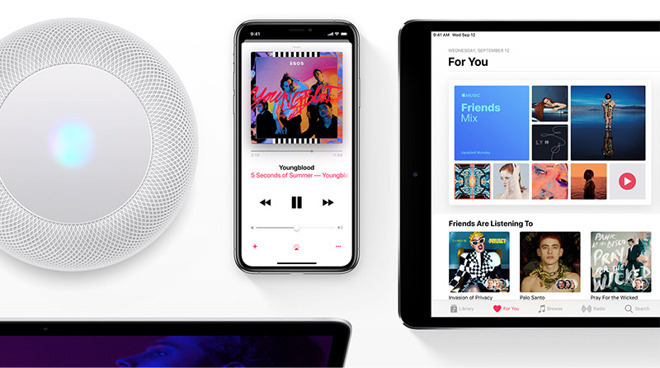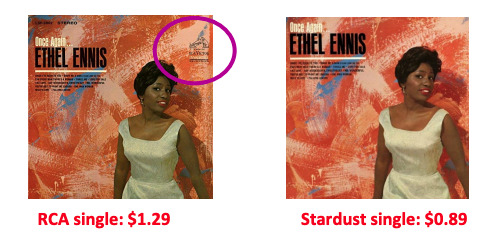'Over the Rainbow' composer's estate sues Apple & others over 'pirated' music sales
Apple and a large number of tech companies have become the subject of a new music lawsuit, with the estate of "The Wizard of Oz" track "Over the Rainbow" composer Harold Arlen accusing the firms of creating a "music piracy operation" that distributes unlicensed and unauthorized versions of copyrighted songs.

Filed in the US District Court of the Central District of California on May 9, the lawsuit from SA Music and Harold Arlen Trust has a lengthy list of defendants, headed up by Apple, Amazon, Google, Microsoft, and Pandora, followed by a large number of distributors and studios.
The suit centers around music licensing, a topic Apple is quite familiar with from assorted legal action against it over the years, but rather than accusations of failing to pay enough royalties or to properly license music, the suit takes a different approach. According to the filing, the music created by Arlen has been the subject of piracy.
Arlen is known for writing many well-known songs, including "Over the Rainbow" from the film "The Wizard of Oz," as well as a number of other tracks, recorded by list of prominent artists including Art Tatum, Ella Fitzgerald, Etta James, Frank Sinatra, Louis Armstrong, and Ray Charles. As the filing claims, "these monumental works of art are, quite literally, national treasures."
The accusation stems from a practice of failing to account for the ownership of music being submitted to music services, which due to a lack of proper clearance and licensing, is deemed to consist of "pirated recordings" by the plaintiff. The failure to obtain a license to authorize the reproduction, distribution, sale, or stream of the recordings is said to be an infringement on the composer's estate's rights.
The suit also insists some instances of the recordings being stolen from rightful licensees are quite blatant. In some cases, the album artwork provided in the allegedly unlicensed version is the same as the original from the licensed version, but cropped or altered to take away the logo of the record company.

An example from the lawsuit of a doctored album cover that removes the record label
Sold in the same online storefronts, the pirated versions could easily be confused for the legitimate editions, but can sometimes get the sale by severely undercutting the original. For example, the 1964 Ethel Ennis recording of "For Every Man There's a Woman" is sold by RCA Sony for $1.29 while the pirated Stardust Records version, complete with doctored album art, sells for $0.89.
The practice is not limited to just singles. Benny Goodman's 1955 album "Get Happy" sold by Capitol Records goes for $7.99 through Google Play and Amazon, while Pickwick Group Limited's unauthorized copy sells for $6.99.
"It is hard to imagine that a person walking into Tower Records, off the street, with arms full of CDs and vinyl records and claiming to be the record label for Frank Sinatra, Louis Armstrong and Ella Fitzgerald, could succeed in having that store sell their copies directly next to the same albums released by legendary record labels, Capitol, RCA and Columbia, and at a lower price," the suit asserts. "Yet, this exact practice occurs every day in the digital music business, where there is unlimited digital shelf space and a complete willingness by the digital music stores and services to seek popular and iconic recordings from any source, legitimate or not, provided they participate in sharing the proceeds."
While Apple and the other stores are not accused directly of making the copied versions, the sale of the unauthorized reproductions makes them complicit. The suit asserts "It is an infringement for which the Pirate Label, Distributor, and Online Defendants are jointly and severally liable."
Due to the sheer number of defendants, the lawsuit includes a total of 216 claims against companies for copyright infringement, with Apple identified as infringing in 39 instances. The high number is due to the combinations of labels, distributors, and storefronts the suit tries to cover.
At the end of the 148-page filing, there is a demand for a jury trial, requests to the court to declare there has been infringement, that each is willful, a permanent injunction barring continued infringement, an award of statutory damages to be determined by the jury, and reasonable attorney's fees.

Filed in the US District Court of the Central District of California on May 9, the lawsuit from SA Music and Harold Arlen Trust has a lengthy list of defendants, headed up by Apple, Amazon, Google, Microsoft, and Pandora, followed by a large number of distributors and studios.
The suit centers around music licensing, a topic Apple is quite familiar with from assorted legal action against it over the years, but rather than accusations of failing to pay enough royalties or to properly license music, the suit takes a different approach. According to the filing, the music created by Arlen has been the subject of piracy.
Arlen is known for writing many well-known songs, including "Over the Rainbow" from the film "The Wizard of Oz," as well as a number of other tracks, recorded by list of prominent artists including Art Tatum, Ella Fitzgerald, Etta James, Frank Sinatra, Louis Armstrong, and Ray Charles. As the filing claims, "these monumental works of art are, quite literally, national treasures."
The accusation stems from a practice of failing to account for the ownership of music being submitted to music services, which due to a lack of proper clearance and licensing, is deemed to consist of "pirated recordings" by the plaintiff. The failure to obtain a license to authorize the reproduction, distribution, sale, or stream of the recordings is said to be an infringement on the composer's estate's rights.
The suit also insists some instances of the recordings being stolen from rightful licensees are quite blatant. In some cases, the album artwork provided in the allegedly unlicensed version is the same as the original from the licensed version, but cropped or altered to take away the logo of the record company.

An example from the lawsuit of a doctored album cover that removes the record label
Sold in the same online storefronts, the pirated versions could easily be confused for the legitimate editions, but can sometimes get the sale by severely undercutting the original. For example, the 1964 Ethel Ennis recording of "For Every Man There's a Woman" is sold by RCA Sony for $1.29 while the pirated Stardust Records version, complete with doctored album art, sells for $0.89.
The practice is not limited to just singles. Benny Goodman's 1955 album "Get Happy" sold by Capitol Records goes for $7.99 through Google Play and Amazon, while Pickwick Group Limited's unauthorized copy sells for $6.99.
"It is hard to imagine that a person walking into Tower Records, off the street, with arms full of CDs and vinyl records and claiming to be the record label for Frank Sinatra, Louis Armstrong and Ella Fitzgerald, could succeed in having that store sell their copies directly next to the same albums released by legendary record labels, Capitol, RCA and Columbia, and at a lower price," the suit asserts. "Yet, this exact practice occurs every day in the digital music business, where there is unlimited digital shelf space and a complete willingness by the digital music stores and services to seek popular and iconic recordings from any source, legitimate or not, provided they participate in sharing the proceeds."
While Apple and the other stores are not accused directly of making the copied versions, the sale of the unauthorized reproductions makes them complicit. The suit asserts "It is an infringement for which the Pirate Label, Distributor, and Online Defendants are jointly and severally liable."
Due to the sheer number of defendants, the lawsuit includes a total of 216 claims against companies for copyright infringement, with Apple identified as infringing in 39 instances. The high number is due to the combinations of labels, distributors, and storefronts the suit tries to cover.
At the end of the 148-page filing, there is a demand for a jury trial, requests to the court to declare there has been infringement, that each is willful, a permanent injunction barring continued infringement, an award of statutory damages to be determined by the jury, and reasonable attorney's fees.

Comments
Sounds like it's probably a difficult area to police, but if there are reasonable and/or established methods that Apple aren't using then it sounds like a legitimate complaint.
It is, indeed. I'm a music educator. Basically everything we do is technically a violation of copyright. There are myriad standards for what is allowed under Fair Use, as well as grey areas where it depends who you ask. It often comes down to a common sense judgement of "are we doing the right thing?" or "what is the likelihood anyone would be sued for this? You can't ask copyright attorneys...they'll tell you everything is illegal. At one point, the RIAA took the legal position that the act of importing a CD to a computer was a violation. As district and state festivals, you have to have the physical band/chorus arrangements sitting on the stage if you use temporary copies (so students don't destroy originals).
Just from a layperson's perspective, I think holding Apple and other services liable is going to be tough. I have no idea what the legal standard for verification of rights would be, but I'd have to assume the labels had to attest to ownership when they submitted. Is Apple expected to independently verify rights on every recording submitted? I can't imagine that would be viewed as reasonable under the law. I can see the labels being held liable, but the services? I doubt it.
If this is how labels can sell on iTunes, then Apple needs to establish a better relationship with the recording industry to verify IP ownership, rather than rely on the honesty of so-called labels. A dead giveaway is when multiple “labels” claim the right to sell the same content. Most label contracts are exclusive.
You're joking right? Apple is largely responsible for fixing a huge problem in the music industry. Digital Piracy was rampant 10+ years ago, and Apple successfully helped to change consumer behaviours to adopt for-pay models for legitimately accessing digital music through iPod and iTunes Music Store. Music is so easy to access digitally now, and for free in many cases (ie. see YouTube).
I think the problem is the sheer quantity of music these days and the difficulty policing it. That's not the same thing as Apple knowing little about what they are managing. It's just a big, big job! As long as they provide an avenue for copyright holders to make requests, then they've covered their bases.